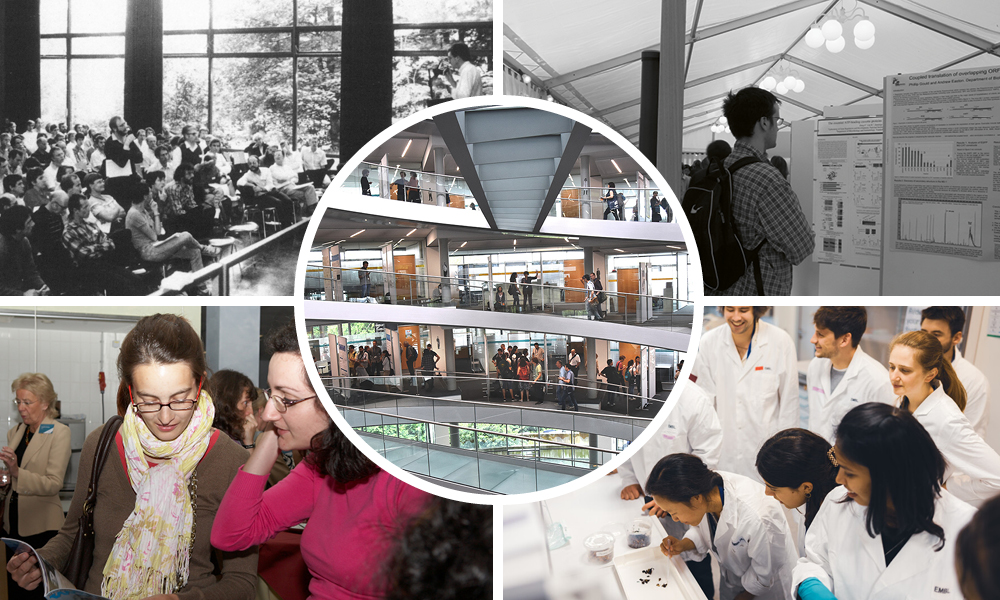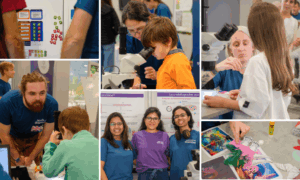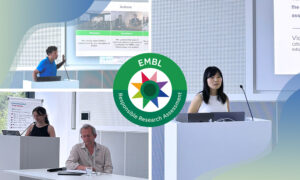
The EMBL Course and Conference Programme: a legacy of excellence
As we mark EMBL’s 50th anniversary, we celebrate not only the groundbreaking research and discoveries that have emerged from this prestigious institution but also the rich history and profound impact of the EMBL Course and Conference Programme

By Jürgen Deka, Head of External Scientific Training
Starting with the first course – on electron microscopy of nucleic acids – in 1977, courses and conferences at EMBL have been a cornerstone of scientific education and collaboration for almost half a century, fostering a global community of researchers dedicated to advancing the frontiers of molecular biology and the life sciences.
From its inception, EMBL’s mission has incorporated the provision of advanced training to scientists both within EMBL and in the wider research community. For scientists external to EMBL, this commitment was formalised through the establishment of the Course and Conference Programme, which has played a crucial role in achieving EMBL’s training mission. Over the past 50 years, this programme has grown to become one of the most respected and influential in the world, offering a diverse array of courses, workshops, symposia, and conferences that address the evolving needs of the scientific community.
The evolution of the Course and Conference Programme
The early years of the EMBL Course and Conference Programme were marked by a focus on foundational topics in molecular biology being investigated at the laboratory at the time. With the opening of the EMBL guest house in 1978, course participants were able to stay within walking distance of the campus for the first time, paving the way for new training offerings. The majority of these early courses were organised in collaboration with EMBO.
Almost a decade later, in 1987, the first EMBL-hosted scientific conference – ‘Oncogenes and Growth Control’ – took place at EMBL Heidelberg, and the EMBL Operon conference venue was opened the following year. As EMBL’s research evolved, so too did the programme, expanding to include emerging topics and cutting-edge technologies. This adaptability has been key to its success, ensuring that participants receive training that is both current and relevant.
In the 1990s, the programme expanded significantly, reflecting the rapid advancements in molecular biology techniques and the increasing complexity of biological research. Courses on topics such as DNA sequencing, protein purification and structure determination, and electron microscopy of biological samples became staples, equipping researchers with the skills needed to harness new technologies and methodologies. These hands-on wet-lab courses provided the participants with the crucial practical experience that complemented the theoretical instructions.
Bioinformatics training became a core offering when EMBL’s European Bioinformatics Institute, in Cambridge, UK, opened a purpose-built training facility in its new East Wing. At this point, EMBL-EBI’s courses, covering an ever-evolving spectrum of data analysis methods from functional genomics through protein sequence, structure and mechanism, to pathway and network analysis, became an essential part of EMBL’s Course and Conference Programme, with an emphasis on open science and open learning resources from the start.
“I attended the 2024 EMBL ‘Host-pathogen interactions’ Conference in Heidelberg and was thoroughly impressed by the experience. The conference featured diverse talks and hosted international speakers who are leaders in their fields. The variety and depth of the presentations were outstanding, providing valuable insights and sparking numerous scientific discussions. ”
Training scientists, students, and visitors at all levels
In 2010, the EMBL Advanced Training Centre (ATC) in Heidelberg was opened. An important investment for the training of scientists worldwide and a hub for scientific exchange and collaboration, it has also established EMBL as a major European centre for lifelong training in molecular biology. It has also allowed EMBL’s external training programme to expand, currently running five times as many events as before the opening of the centre.
With the latest high-tech equipment on site, the centre facilitates the delivery of advanced scientific training and provides participants with state-of-the-art meeting rooms, computer facilities, and on-site laboratories for cutting-edge practical courses. The additional involvement of EMBL and external scientists and groups brings together top-level expertise across the board, and allows this knowledge to be shared with the scientific community.
However, it doesn’t end there. Top-class courses are also run at the other EMBL sites in Barcelona, Hamburg, Rome and Grenoble. In fact, the demand for bioinformatics training became so high that it demanded a scale-up of EMBL-EBI’s facilities, and the opening of the EMBL-EBI South building, including two state-of-the-art computer training rooms, provided this in 2014. EMBL-EBI also offers live webinars and on-demand training courses for those unable to attend events in person.
“This course was at the same time the most educational as well as enjoyable experience I had since finishing university. Everyone who wants their head to spin from the gained knowledge but also wants to meet a group of great people, this is the course for you.”
The course and conference programme has also increased substantially in volume over the years, with 60 courses and 25 conferences and symposia taking place in 2023 alone. Over 40 dedicated staff are responsible for the smooth running of this ever-expanding programme, ensuring EMBL’s mission to train scientists, students, and visitors at all levels is achieved year in, year out. In 2023, more than 9000 scientists attended our EMBL conferences and courses in person and virtually. In addition, users from about 600,000 unique IP addresses visited the online training resources hosted by EMBL-EBI.
Enabling collaboration and interdisciplinary research
One of the hallmarks of the EMBL Course and Conference Programme is its emphasis on fostering collaboration. By bringing together researchers from diverse backgrounds and disciplines, the programme creates an environment conducive to the exchange of ideas and the formation of new collaborations. This has been particularly important in the context of multidisciplinary research, where breakthroughs often arise from the intersection of different fields. Events illustrating this concept are, for example, the EMBO|EMBL Symposia ‘Innate immunity in host-pathogen interactions’ or ‘AI and biology’.
The programme’s conferences have served as important forums for the dissemination of new findings and the discussion of emerging trends. These events attract leading scientists from around the world, providing participants with the opportunity to learn from and network with experts in their field. Over the years, many seminal discoveries have been presented at EMBL conferences, underscoring their role as catalysts for scientific progress.
“I was thoroughly impressed by the breadth of topics covered and the quality of speakers at the conference. Especially, impressive name of each session made the conference a standout event, offering rich content and valuable connections with peers and experts. It was a rewarding experience.”
Adapting to a changing world: The digital era
In recent years, the EMBL Course and Conference Programme has embraced novel digital technologies, incorporating online courses and virtual conferences to reach a global audience. This shift was accelerated by the COVID-19 pandemic, which necessitated a rethinking of traditional in-person events. The programme’s ability to pivot rapidly to virtual formats ensured that it continued to provide high-quality training and networking opportunities throughout and now beyond the pandemic.
The move to digital platforms has also democratised access to the programme, allowing researchers from regions with limited resources to participate. This has further enhanced the programme’s impact, extending its reach and fostering a truly global community of scientists while controlling the carbon footprint of the programme.
A legacy of excellence
From the early courses on recombinant DNA technology to the latest workshops on CRISPR/Cas genome editing and single-cell genomics, the programme has continually adapted to meet the needs of the scientific community. Its impact is evident in the countless researchers who have benefited from its offerings, many of whom have gone on to make significant contributions to their fields. Since 2022, particularly, the integration of new topics in EMBL’s 2022–2026 scientific programme ‘Molecules to Ecosystems’ has shaped our training offerings. Conferences and courses on the biology of global ecosystems, aspects of climate change and loss of biodiversity, as well as on infection biology and theory in biology, have been added to the programme portfolio. At the same time, novel and innovative training on data sciences and bioinformatics overarches the offerings on specific wet-lab topics and technologies.
The success of the programme is illustrated by the experiences of its participants. Over the years, countless scientists have shared their feedback on the programme and how it has influenced their careers and research. From early-career scientists gaining new skills and perspectives to established researchers forming collaborations that lead to groundbreaking discoveries, the impact of the programme is profound and far-reaching.
Looking ahead, the EMBL Course and Conference Programme is poised to continue its legacy of excellence. Emerging fields such as synthetic biology, personalised health and medicine, and AI in biology present new opportunities for the programme to innovate and expand. By staying at the forefront of scientific research, the programme will continue playing a crucial role in advancing our understanding of molecular biology and life in context for the next 50 years. We look forward to welcoming you to EMBL at one of our exciting conferences or courses in the future.
This article is part of a special series on EMBL’s training mission, published as part of our 50th anniversary celebrations.


